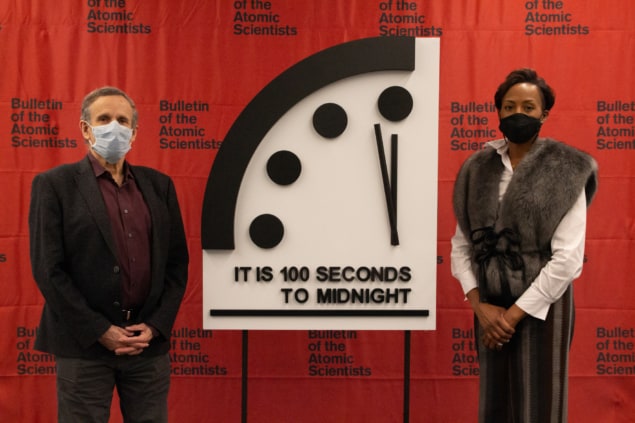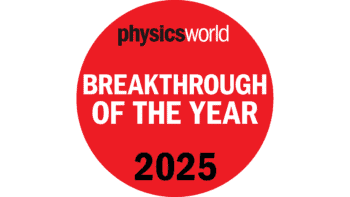
For the second year running the Doomsday Clock is at 100 seconds to midnight – its latest ever time. The decision was announced yesterday by the Bulletin of the Atomic Scientists, the publication founded in 1945 by physicists concerned by the existential threat of nuclear weapons.
“The pandemic revealed just how unprepared and unwilling countries and the international system are to handle global emergencies properly,” says Bulletin editor John Mecklin. “As a result, many hundreds of thousands of human beings died needlessly.”
Created by the Bulletin in 1947, the clock provides a metaphor for how close we are to a humanity-ending catastrophe. Having begun at seven minutes to midnight (mainly for aesthetic reasons), the clock has ticked further or closer to midnight depending on prevailing nuclear concerns.
Each year, the clock is set by the Bulletin’s science and security board in consultation with its board of sponsors, which includes 13 Nobel laureates. Since the mid 2000s, the clock-setters have also been factoring in the risk of climate change, and more recently the threats of disruptive technologies such as artificial intelligence.
History was made in January 2020, when the clock was set to 100 seconds to midnight, the closest it had ever been to the doomsday scenario. That decision was based on the continuing existence of nuclear arsenals coupled with the lapse of several major arms-control treaties, and the US’s decision to quit the Iran nuclear deal.
Since then, the COVID-19 outbreak evolved into a global pandemic, so many had expected the clock to tick even closer to midnight this year.
But in the eyes of Bulletin scientists, the COVID-19 pandemic is a tragedy but not an existential threat in the same realm as nuclear war and climate change. They also cite some recent positive developments, such at the US’s intention to rejoin the Paris Agreement on climate change and to extend the New START arms control agreement with Russia.
Doomsday Clock ticks closer to disaster
Overall though, there is no attempt to sugarcoat the bleak global situation.
“The lethal and fear-inspiring COVID-19 pandemic serves as a historic wake-up call, a vivid illustration that national governments and international organizations are unprepared to manage the truly civilization-ending threats of nuclear weapons and climate change,” says Rachel Bronson, president and CEO of the Bulletin.
The Bulletin statement concludes by providing 16 practical steps for world leaders to initiate in 2021. Alongside the nuclear warnings, there are pleas to ramp up decarbonization, boost biological research, and to ethically combat Internet-enabled misinformation.




